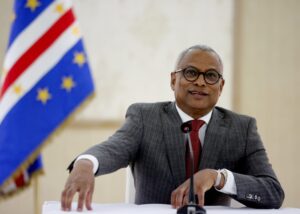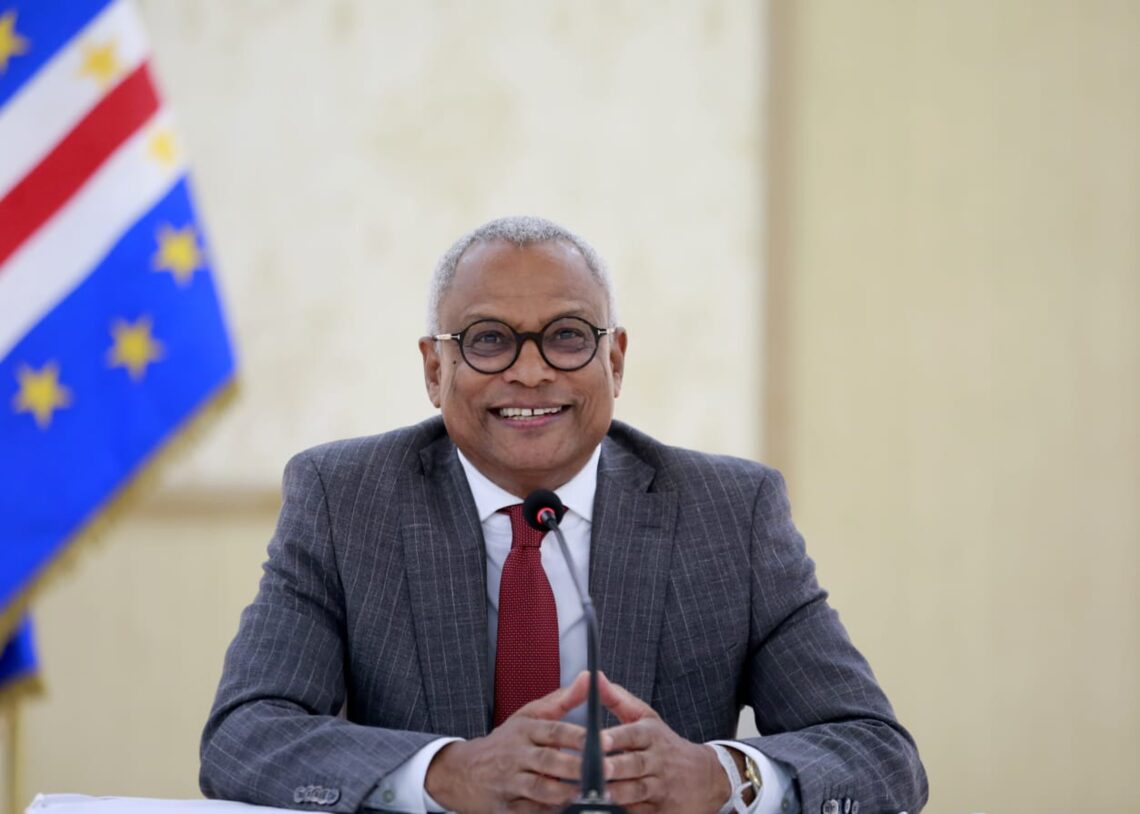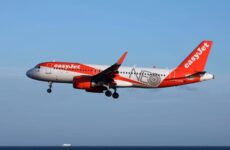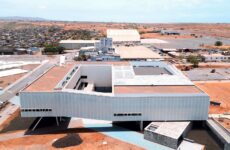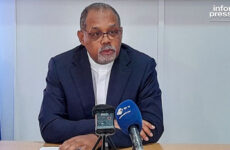The interview with the President of the Republic of Cape Verde, José Maria Neves, was conducted by doc. Mgr. Iva Svobodová, Ph.D. from the Institute of Romance Languages and Literatures at Masaryk University.
Iva: First of all, I would like to express my gratitude for the opportunity to conduct this interview, Mr President, and especially for the chance to share some of your views and visions on the present and future of Cape Verde, as well as on your professional career.
Before I ask the first question, allow me to recall some key moments in the country’s history. Like other islands in the Atlantic, Cape Verde was uninhabited before it was discovered by Portuguese explorers. Since the 15th century, however, we have witnessed great changes in the country’s history, especially in the 20th century (more precisely in 1975), when the country declared its independence. And this is where I would like to start our conversation:
- What has affected the country most since this year? What have been the key moments in the modern history of Cape Verde, Mr President?
“Well, first of all, we have the primary moment of the Republic, which was the declaration of independence on 5 July 1975. It was an important date. A country like Cape Verde, a small island state, was unlikely in 1975. The second important moment was the country’s eligibility. Implausible became possible – thanks to national reconstruction efforts, but also thanks to the transition to democracy that took place in 1990. After independence, the country had a one-party regime within the framework of the Guineo-Cape Verdean unity. In 1980 there was a split in the bi-national party – PAIGC – which governed both countries, leading to the formation of a new party in Cape Verde – PAICV – which continued to govern the country in a one-party regime until 1990.
In 1991, the first free and democratic elections were held: an important moment that allowed the establishment of the rule of law based on rights, freedoms and guarantees, a government elected by the people in free and democratic elections, stability and the formulation of visions to transform Cape Verde into a more modern and competitive country. And I must add that in recent years, especially in the twenty-first century, a process of modernisation has been underway that has transformed the country into a richer, more competitive one, offering more opportunities to all. It can therefore be said that these elements are essential components of the recent history of Cape Verde, which has gone from being an unlikely country to being a country of opportunity”.
- In which direction do you see your country today, Mr. President? How do you see the future of Cape Verde in the next 10 years?
“Cape Verde is in a process of accelerated development. We are in an incredibly complex and challenging global context. Climate change, geopolitical conflicts, poverty, pandemics, inequalities – all these create very complex and complicated dynamics. For a small island state like Cape Verde, this means that we have to work on ourselves. I see Cape Verde ten years from now as a more modern, richer, poverty-free, fairer, more inclusive and, above all, a country with more opportunities: opportunities for employment, investment, growth and development, using our resources such as the sea, the sun and the wind”.
- You have held various positions in your life, including Prime Minister and Minister of Finance of the Republic of Cape Verde. Can you analyse the country’s economic situation with the utmost competence? How far do you think the Cape Verdeans can increase their GDP per capita or other indicators capable of attracting investors and tourists to the country in a meaningful future?
“I think all the conditions are there. The crisis caused by the pandemic brings new opportunities. We need to take some internal steps. First, we need to continue to develop our infrastructure (ports, airports, roads, water, sanitation, telecommunications, information technology) so that we can attract investment, especially in tourism, which is the engine that drives our economy. At the moment we have mainly sun and beach tourism on the islands of Sal, Boa Vista, Maio…
We need to diversify tourism and develop natural, residential, cultural and religious tourism. We need to develop tourism and create more opportunities for investment and growth on all the islands.
Secondly, we need to develop land and sea transport between the islands. Connectivity is the key to integrating all islands into the growth dynamics of the country. Developing transport will make it possible to increase and dynamise the mobility of people and goods between the islands, boost domestic tourism and promote territorial cohesion. But we must also ensure that tourists from outside can quickly visit all the islands.
Thirdly, to ensure the country’s competitive integration into the CEDEAO area. This is the key for Cape Verde: to be better integrated into CEDEAO and to use all its capacities for growth. As a stable and safe country for investment, Cape Verde can be an investment hub for West Africa and a gateway to Africa. Cape Verde can also be a renewable energy cluster for the whole region. We have the capacity to produce more than 400% of our needs with solar, wind and green hydrogen. In this way, Cape Verde can become a hub for the production, distribution, research, training and trade of renewable energy products for the whole region, i.e. for more than 300 million consumers. These are important investment opportunities.
Cape Verde can also be an important technology platform and service provider for the whole region. For example, they can develop education, research on artificial intelligence – how to use artificial intelligence in growth services, which will make it possible to accelerate the development process and mitigate the effects of climate change. Cape Verde can also be an important cluster in the health sector. Referral hospitals could be established to serve the entire region, not only in person but also through telemedicine, and to develop the pharmaceutical industry.
If we look at these elements, we can see that there are huge opportunities for growing the economy, attracting private investment, diversifying tourism and exploiting strategic areas that were not as obvious as sun, wind and sea. After all, we have the whole maritime economy. Cape Verde is a small country, but there is one area where it can be a superpower and that is the blue economy. 99% of our country is sea, more than 800,000 square kilometres, and we just have to turn to the sea and take advantage of all its possibilities, from water production to industry, transport, tourism, etc.”.
- Cape Verde does indeed have great potential and good conditions to develop and attract foreign investment: a process that is already underway. But what are the countries of origin of most foreign investors in Cape Verde?
“There is already a certain amount of investment. We have the potential to go further, to accelerate the pace. At the moment, most of these investments come from Europe. But we can attract investors from Africa, the Americas, the Gulf and Asia. We need to diversify investment opportunities and encourage partnerships between European entrepreneurs and entrepreneurs from other parts of the world to raise capital and know-how.
- As you can see, Cape Verde has a huge potential and the best conditions to expand worldwide. But it’s safe to assume that most of the investors come mainly from Portuguese-speaking countries because of the common official language, isn’t it?
“Investments are not only coming from lusophone countries. Look, the hotels on the island of Sal started with Italian investment. Then came investment from Spain, and Portuguese investment is less frequent. We need more investment from France, the United Kingdom, the United States and northern European countries. Make sure that Northern European countries or Eastern European countries can also invest more in Cape Verde. They are the ones who contribute most to tourism in Cape Verde. The first steps have already been taken. With the arrival of tourists, diplomats and investors will come”.
- Are you not concerned about the excessive influence of China and Russia, countries that have recently worked hard to promote their own interests in Africa?
” There is no danger for us. Every country has to defend its interests”.
- Mr President, Cape Verde has great ambitions to become a major holiday destination for European tourists. What is the country doing to achieve this?
” It is a question of continuing to invest in modernising and improving the infrastructure, improving things internally. We have all the ingredients, all the elements. We just need to be a little more sophisticated, to do things well enough to meet the demand. And to do our homework to promote the country in European countries, but also in other countries where we want to attract tourists to Cape Verde, especially in the United States, South America and Africa. There are a lot of people in Africa who travel and spend money in Europe and the United States, and they can spend it here in Cape Verde.
- It should be noted that there are frequent flights between Cape Verde and the Czech Republic, up to several times a week. Czech tourists seem to enjoy travelling to Cape Verde and visit the country throughout the year. How does the country react to this situation? What is being done to make tourists happy to come, but also to return?
“I believe that Cape Verde as a destination is becoming more and more qualified and therefore more and more sought after. Gradually, as I said, we are creating the conditions for more tourists to come. At the moment, more tourists are coming because we have more airports, better roads, good communications and good hotels. We can continue in this way, because when tourists demand a certain country, other services such as transport and new hotels appear according to the new demands of the tourists themselves. So we continue to work to improve the quality of tourism, to improve the reception of tourists, to improve the quality of services and to make people feel good in Cape Verde”.
- And at the highest level: what joint steps have been taken in cooperation with the Czech Republic or how could cooperation between the two countries work in the near future, Mr President?
“There are not very strong economic and business cooperation relations with the Czech Republic at the moment, except for the students who come and study there. After independence, many students studied in the former Czechoslovakia and therefore in the Czech Republic. If you come to Cape Verde, you will be able to speak Czech with some Cape Verdeans. We need to find ways to strengthen economic and business cooperation between the two countries for mutual benefit.
I think the Czech-Cape Verde Chamber of Commerce can play an important role in bringing the two countries closer together and between business people. I attended a trade fair in Praia organised by this chamber, where I had the honour of giving the closing speech, and I realised that there are huge opportunities, huge possibilities. We must work diplomatically to bring the Czech Republic and Cape Verde closer together. And with this interview, I call on the government of the Czech Republic to find ways to strengthen these friendly relations and cooperation. And there are many opportunities that arise from the various aspects that we have discussed in this interview.
- Question on your publishing activities: You are the author of several books, articles and essays. Do you have any further plans in this area? For example, are you thinking of writing more books?
A: “At the moment I have resumed work on my dissertation, which I intend to finish. So I am doing research for my dissertation, which is about the influence of the diaspora on political decision-making in Cape Verde. But I’m also thinking of writing a book for the 50th anniversary of our independence, in the form of a letter about politics, addressed to young people.
- Mr President, do you have any final remarks or comments you would like to add?
“I would like to say that in all these areas we have talked about, there are important opportunities for exchange. The youth of the Czech Republic can open up new avenues. There are universities, foundations, NGOs, writers, musicians… In today’s complex world, we need to listen to music in order not to kill each other. Cape Verdean music is very rich, very diverse. There are young entrepreneurs. Cape Verde is a country with many possibilities. There are many things to discover. As the great Portuguese poet Fernando Pessoa said: ‘… I feel that every moment I am born into the eternal novelty of the world. Young people can discover this newness. And that is all: that young people have the whole world to expand the possibilities of relations between the Czech Republic and Cape Verde”.
- Mr President, I would like to thank you very much for your time and your willingness to have this conversation. It has been a great honour. We wish you every success in your important role and we firmly believe in the prosperity and well-being of the Republic of Cape Verde.
“Thank you for everything and I wish you every success. Through your interest and efforts, you can work a miracle of multiplication by bringing these two countries closer together”.
